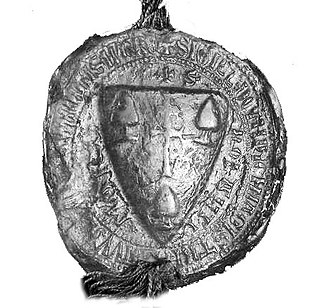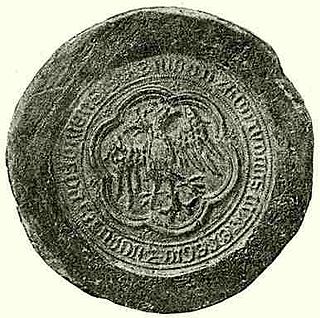 W
WFerenc Batthyány de Németújvár was a Hungarian magnate and general, member of the prestigious Batthyány family. He served as Ban of Croatia, Dalmatia and Slavonia from 1522 to 1526 and, as a partisan of King Ferdinand I, from 1527 to 1531.
 W
WEmeric (I) Bebek was a Hungarian powerful baron, who rose to prominence during the last regnal years of King Louis I of Hungary. After 1382, he was a staunch supporter of Mary, Queen of Hungary. Recognizing Sigismund's accession to the throne, he was made Judge royal, then Voivode of Transylvania. He received numerous land donations, which founded the wealth and influence of his family in the 15th century.
 W
WMatthew (II) from the kindred Csák was a powerful Hungarian baron, landowner and military leader, who held several secular positions during the reign of kings Béla IV, Stephen V and Ladislaus IV. He was the first notable member of the Trencsén branch of the gens ("clan") Csák. His nephew and heir was the oligarch Matthew III Csák, who, based on his uncles' acquisitions, became the de facto ruler of his domain independently of the king and usurped royal prerogatives on his territories.
 W
WDemetrius Zvonimir was a King of Croatia and Dalmatia from 1076 until his death in 1089. He was crowned as king in Solin on 8 October 1076. Zvonimir also served as Ban of Croatia (1064–1074), and was named Duke of Croatia in around 1075. His native name was Zvonimir; he adopted the forename Demetrius at his coronation.
 W
WSigismund Ernuszt was Bishop of Pécs in the Kingdom of Hungary from 1473 to 1505. Ernuszt was also Ban of Croatia, Dalmatia and Slavonia from 1494 to 1498. He was the son of John Ernuszt, a converted Jew, who started his career as a custom's duty collector during the reign of Matthias Corvinus, King of Hungary. Sigismund studied at the universities of Vienna and Ferrara in the early 1470s. When the king made him bishop of Pécs, the Holy See confirmed him as the administrator of the diocese, but he was most probably never ordained bishop. Matthias Corvinus also tasked him with the administration of the newly conquered Archduchy of Austria in 1486.
 W
WStephen (I) from the kindred Gutkeled was a Hungarian influential lord, an early prominent member of the gens Gutkeled and ancestor of its Majád branch. He governed the Duchy of Styria on behalf of claimants Duke Béla and Duke Stephen from 1254 until his death.
 W
WHermann II, Count of Celje, was a Styrian nobleman and magnate, most notable as the faithful supporter and father-in-law of the Hungarian king and Holy Roman Emperor Sigismund of Luxembourg. Hermann's loyalty to the King ensured him generous grants of land and privileges that led him to become the greatest landowner in Slavonia. He served as governor of Carniola, and twice as ban of the combined provinces of Slavonia, Croatia and Dalmatia, and was recognized by a treaty in 1427 as heir presumptive to the Kingdom of Bosnia. The House of Celje's rise to power culminated in achieving the dignity of Prince of the Holy Roman Empire. At the peak of his power, he controlled two thirds of the land in Carniola, most of Lower Styria, and exercised power over all of medieval Croatia. Hermann was one of the most important representatives of the House of Celje, having brought the dynasty from regional importance to the foreground of Central European politics.
 W
WMartin from the kindred Hont-Pázmány was a Hungarian influential lord in the Kingdom of Hungary, who served as Judge royal in 1214, during the reign of Andrew II of Hungary.
 W
WNicholas of Ilok was a Hungarian nobleman, Ban of Croatia, Slavonia, Dalmatia and Macsó, Voivode of Transylvania and titular King of Bosnia from 1471 until his death.
 W
WLadislaus I from the kindred Kán was a powerful Hungarian baron, who held several secular positions during the reign of kings Andrew II and Béla IV.
 W
WHenry (I) Kőszegi from the kindred Héder, commonly known as Henry the Great, was a Hungarian influential lord in the second half of the 13th century, founder and first member of the powerful Kőszegi family. Henry was one of the most notable earlier "oligarchs", who ruled de facto independently their dominion during the era of feudal anarchy.
 W
WIvan Kőszegi was an influential lord in the Kingdom of Hungary at the turn of the 13th and 14th centuries. Earlier historiographical works also refer to him Ivan Németújvári. He was Palatine in 1281, between 1287 and 1288, and from 1302 until 1307, Ban of Slavonia in 1275, from 1284 until 1285 and in 1290, and Master of the treasury in 1276 and 1291.
Stephen (I) Lackfi was an influential nobleman and a successful military leader in the Kingdom of Hungary. He played a significant role in the Neapolitan campaigns of Louis the Great.
 W
WBlaise Magyar, also Blaž the Magyar, was a military commander and great officer of state in the Kingdom of Hungary in the 15th century. His military career started under the command of John Hunyadi. In the reign of John Hunyadi's son, Matthias Corvinus, he was Ban of Croatia from 1470 to 1472 and in 1483, Ban of Slavonia between 1470 and 1471 and in 1483, Ban of Bosnia from 1470 to 1471, and Voivode of Transylvania between 1472 and 1475. He died at Kassa in 1490.
 W
WRoland (I) from the kindred Rátót was a Hungarian influential lord, who held several important secular positions for decades. He was also the ancestor of the Paksi family.
 W
WNicholas Szécsi de Felsőlendva was a Hungarian nobleman from the influential House of Szécsi.
 W
WUlrich II, or Ulrich of Celje, was the last Princely Count of Celje. At the time of his death, he was captain general and de facto regent of Hungary, ban (governor) of Slavonia, Croatia and Dalmatia and feudal lord of vast areas in present-day Slovenia, Croatia, Bosnia, Austria, and Slovakia. He was also a claimant to the Bosnian throne. He was killed by agents of the Hunyadi clan under unknown circumstances, which plunged Hungary into civil unrest that was resolved a year later by the sudden death of king Ladislas the Posthumous and the election of Matthias Corvinus, the son of John Hunyadi and Ulrich's son-in-law, as king. Ulrich's possessions in the Holy Roman Empire were inherited by the Habsburg Emperor Frederick III, while his possessions in Hungary were reverted to the crown.